【新课标】Unit 2 Section B (3a—Self Check) 课件(人教新目标八上Unit 2 How often do you exercise )
文档属性
| 名称 | 【新课标】Unit 2 Section B (3a—Self Check) 课件(人教新目标八上Unit 2 How often do you exercise ) | 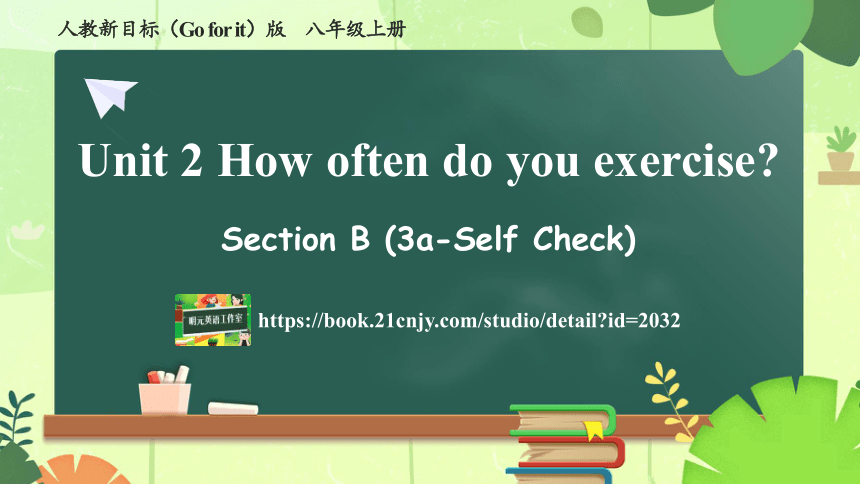 | |
| 格式 | pptx | ||
| 文件大小 | 9.9MB | ||
| 资源类型 | 试卷 | ||
| 版本资源 | 人教新目标(Go for it)版 | ||
| 科目 | 英语 | ||
| 更新时间 | 2023-09-06 12:44:37 | ||
图片预览


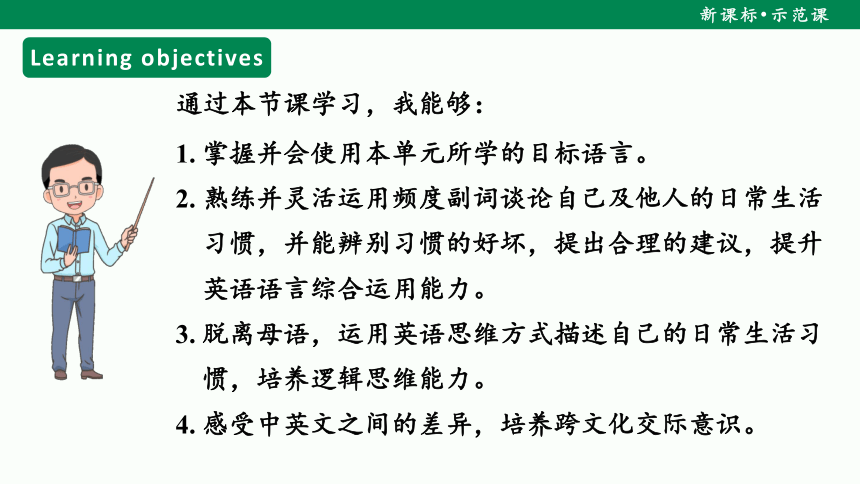
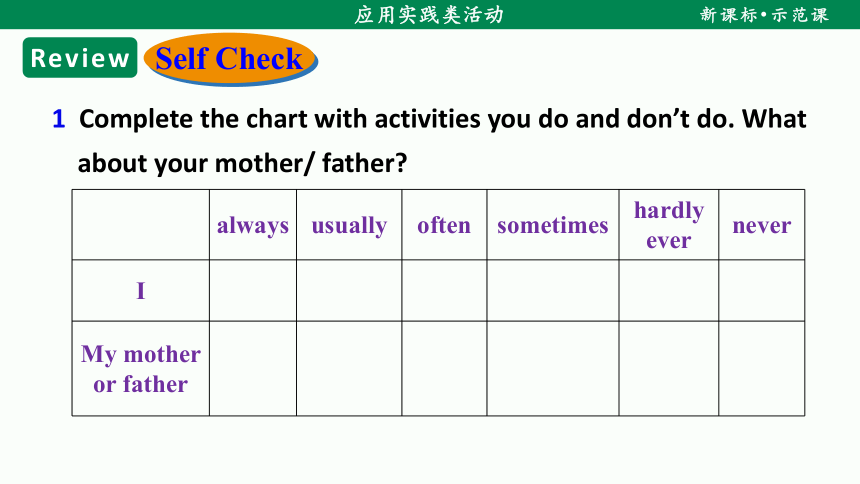
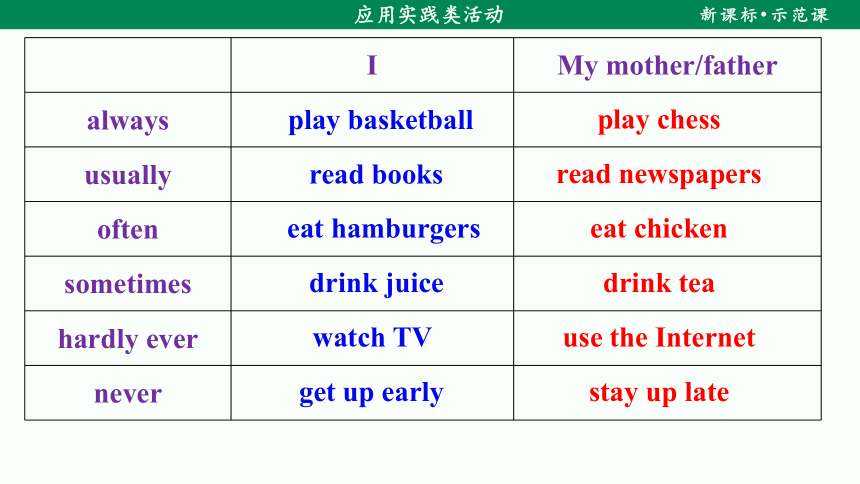
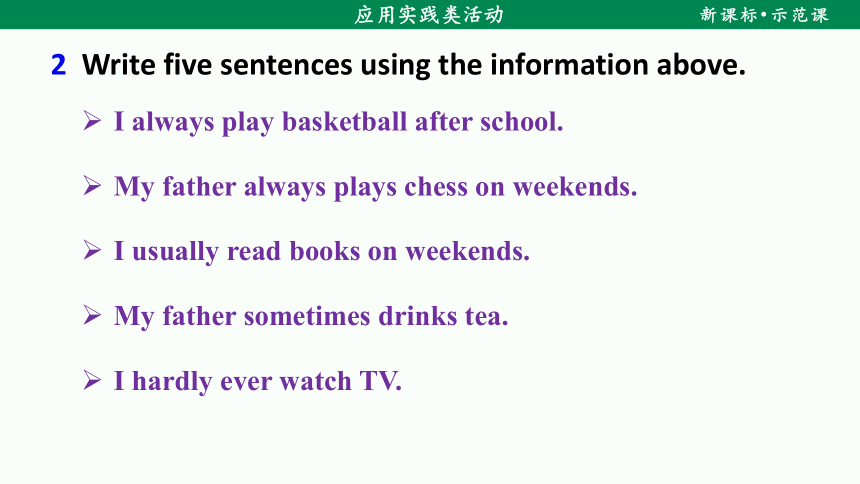
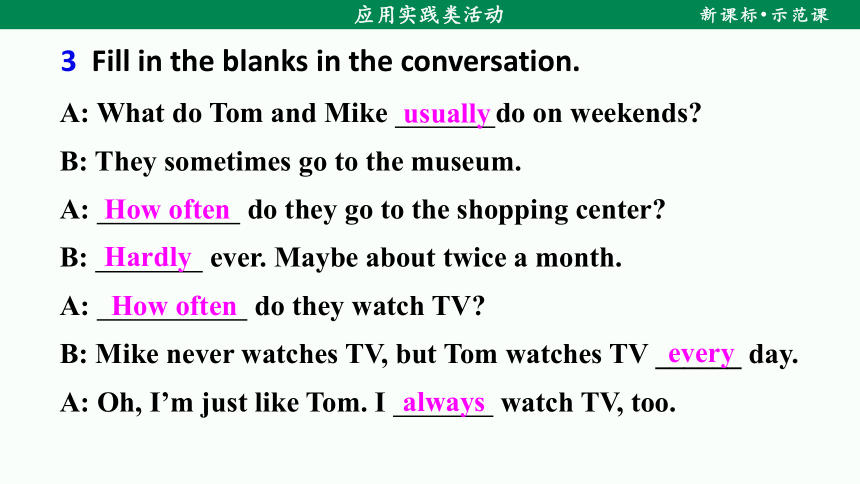
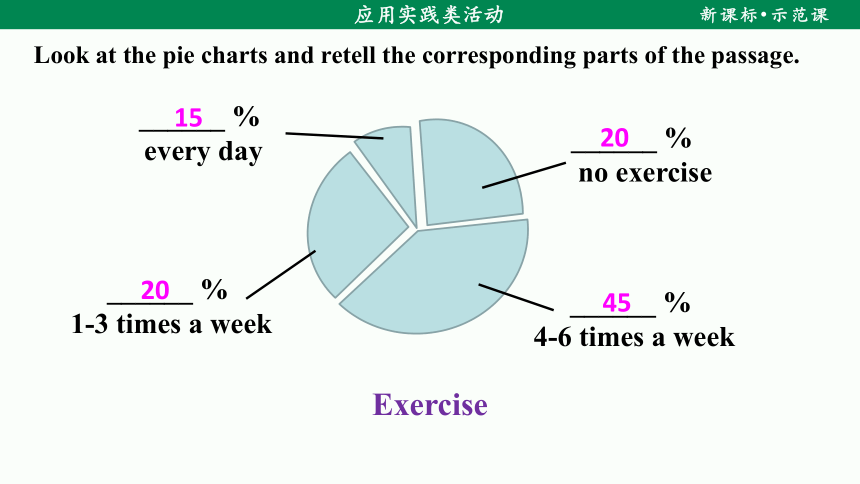
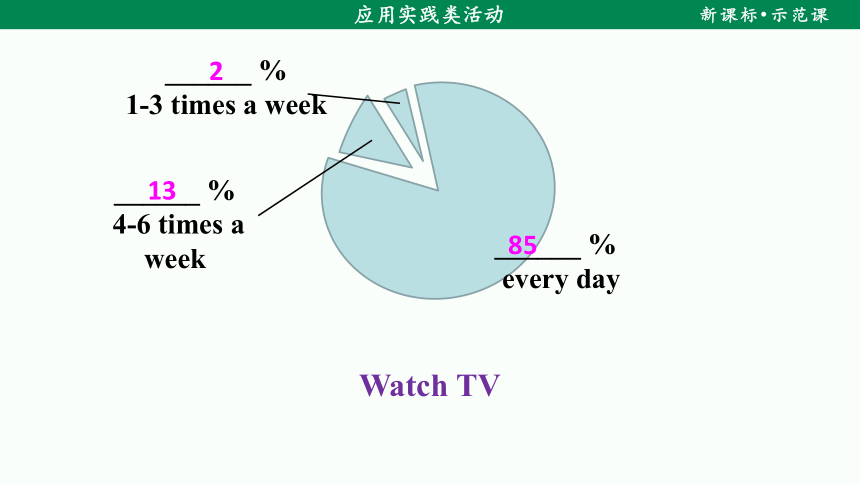
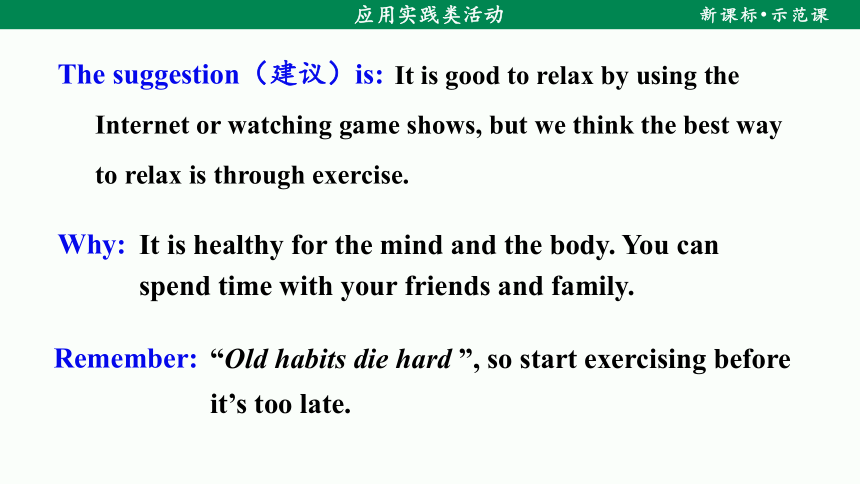
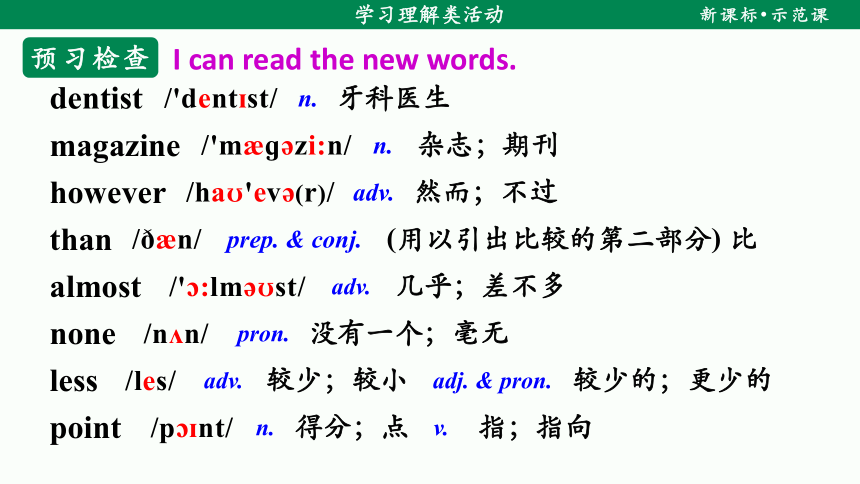
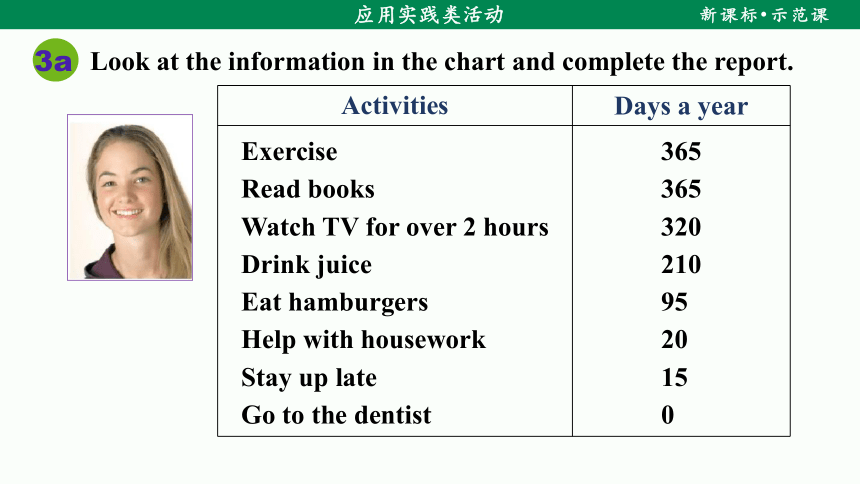
文档简介
(共34张PPT)
人教新目标(Go for it)版 八年级上册
Section B (3a-Self Check)
https://book.21cnjy.com/studio/detail id=2032
Unit 2 How often do you exercise
通过本节课学习,我能够:
1. 掌握并会使用本单元所学的目标语言。
2. 熟练并灵活运用频度副词谈论自己及他人的日常生活
习惯,并能辨别习惯的好坏,提出合理的建议,提升
英语语言综合运用能力。
3. 脱离母语,运用英语思维方式描述自己的日常生活习
惯,培养逻辑思维能力。
4. 感受中英文之间的差异,培养跨文化交际意识。
1 Complete the chart with activities you do and don’t do. What
about your mother/ father
always usually often sometimes hardly ever never
I
My mother or father
应用实践类活动
Self Check
Review
I My mother/father
always
usually
often
sometimes
hardly ever
never
play basketball
play chess
read books
read newspapers
eat hamburgers
eat chicken
drink juice
drink tea
watch TV
use the Internet
stay up late
get up early
应用实践类活动
2 Write five sentences using the information above.
I hardly ever watch TV.
I always play basketball after school.
My father always plays chess on weekends.
I usually read books on weekends.
My father sometimes drinks tea.
应用实践类活动
3 Fill in the blanks in the conversation.
A: What do Tom and Mike do on weekends
B: They sometimes go to the museum.
A: do they go to the shopping center
B: ever. Maybe about twice a month.
A: do they watch TV
B: Mike never watches TV, but Tom watches TV ______ day.
A: Oh, I’m just like Tom. I watch TV, too.
usually
How often
Hardly
How often
every
always
应用实践类活动
应用实践类活动
Look at the pie charts and retell the corresponding parts of the passage.
______ %
every day
______ %
4-6 times a week
______ %
1-3 times a week
______ %
no exercise
20
15
20
45
Exercise
Watch TV
______ %
4-6 times a week
13
______ %
1-3 times a week
2
______ %
every day
85
应用实践类活动
The suggestion(建议)is:
It is good to relax by using the
Why:
It is healthy for the mind and the body. You can spend time with your friends and family.
“Old habits die hard ”, so start exercising before
it’s too late.
Remember:
Internet or watching game shows, but we think the best way
to relax is through exercise.
应用实践类活动
I can read the new words.
dentist
magazine
however
than
牙科医生
杂志;期刊
然而;不过
(用以引出比较的第二部分) 比
n.
n.
adv.
prep. & conj.
/ n/
/ha ev (r)/
/ dent st/
/ m ɡ zi:n/
almost
none
less
几乎;差不多
较少的;更少的
没有一个;毫无
较少;较小
adv.
pron.
adj. & pron.
adv.
/les/
/n n/
/ :lm st/
point
得分;点
n.
/p nt/
指;指向
v.
学习理解类活动
3a
应用实践类活动
Look at the information in the chart and complete the report.
Activities Days a year
Exercise Read books Watch TV for over 2 hours Drink juice Eat hamburgers Help with housework Stay up late Go to the dentist 365
365
320
210
95
20
15
0
Jane is a 16-year-old high school student in the United States. American Teenager magazine asked her about her habits. Jane has a lot of good habits. She always exercises and she reads books __________. Also, she _______ drinks juice and she ___________ stays up late. However, she has some bad habits, too. She _______ watches TV for more than two hours a day, and she __________ eats hamburgers. Her parents are not very happy because she ____________ helps with housework and she _______ goes to the dentist for teeth cleaning. She says she is afraid!
every day
often
hardly ever
usually
sometimes
hardly ever
never
应用实践类活动
3b
应用实践类活动
Complete the chart with your own information. In the last column, use expressions like always, every day, twice a week and never.
Activities How often
Good habits
Bad habits
Talk about your good habits.
I exercise for one hour every day.
I usually help with the housework.
I drink milk every day.
I never stay up late.
应用实践类活动
I eat fruit and vegetables every day.
Talk about your bad habits.
I play computer games every day.
I watch TV for over an hour every day.
I eat hamburgers three to five times a week.
应用实践类活动
Habits Activities How often
Good habits
Bad habits
every day
usually
never
usually
exercise and drink milk
help with the housework
clean my room
stay up late
get up early
eat fruit and vegetables
watch TV
play computer games
eat hamburgers
every day
three to five times a week
应用实践类活动
always
every day
an hour every day
3c
应用实践类活动
________________________________________
________________________________________
________________________________________
________________________________________
________________________________________
________________________________________
Write a report about your good and bad habits. Say how often you do things. Use the report in 3a as an example.
1. 写自己日常生活中的好习惯与坏习惯,应用一般现在时
态。
2. 首先,将自己的好、坏习惯列个清单,标明自己做这些
事情的频率。
3. 然后,依次将这些事情完整地表达出来,注意频率副词
的使用。
4. 最后,通读一遍自己的文章,看有没有错误的地方。
写作指导
应用实践类活动
Beginning:介绍自己的信息。
(background)
Body:
____ have ____ good habits.
1.____________________
2.____________________
3.____________________
good
However, ____ have ____ good habits.
1.____________________
2.____________________
3.____________________
bad
Ending
Outline
应用实践类活动
Hello, everyone. I am Jack. I have a lot of good habits. I exercise and drink milk every day. I usually help my mother with the housework and clean my room by myself. I eat fruit and vegetables every day. I hardly ever stay up late and always get up early. But I also have some bad habits. I watch TV for an hour every day. I like playing computer games every day. I like eating hamburgers, too. I eat hamburgers three to five times a week. It’s bad for my health. But I can’t get rid of it.
应用实践类活动
I have lots of good habits. I exercise every day. I always read books. I also eat fruit every day. I drink milk twice a week. I never stay up late. But I have some bad habits, too. I always watch TV for two hours a day. I use the Internet every day. I hardly ever help with housework. I never go to the dentist.
应用实践类活动
________________________________________
________________________________________
________________________________________
________________________________________
________________________________________
________________________________________
应用实践类活动
4
应用实践类活动
Take the health pare your results with your partner’s. Who’s healthier
1. How often do you eat breakfast
a. Never b. A few times a week c. Almost every day.
2. How often do you eat fast food
a. Never b. A few times a week c. Almost every day
3. How often do you eat vegetables and fruit
a. Never b. A few times a week c. Almost every day
4. How often do you exercise
a. A few times a year b. A few times a month c. A few times a week
5. How many hours do you watch TV every week
a. None b. One to four c. Five or more
6. How many hours do you usually sleep at night
a. Less than six. b. Six or seven c. Eight or more
1. a=0, b=1, c=2
2. a=2, b=1, c=0
3. a=0, b=1, c=2
4. a=0, b=1, c=2
5. a=2, b=1, c=0
6. a=0, b=1, c=2
9-12 points:
You’re really healthy! Good for you—and your
health!
4-8 points:
You’re smart about your health most of the time.
0-3 points:
You have to learn more about healthy habits.
Don’t worry— you can do it!
Are you healthy
应用实践类活动
1. However, she has some bad habits, too.
(1) however adv. 然而;不过, 可置于句首、句中或句末,
且常用于与其他句子成分隔开。
It’s raining hard. However, I still want to go there.
天正下着大雨。然而我还是想去那儿。
He was feeling bad. He went to school, however.
他感觉不好。然而,他还是去上学了。
学习理解类活动
常见短语有:
① eating habit 饮食习惯
The boy has a bad eating habit. 这个男孩饮食习惯不好。
habit n. 习惯;习性
② get into the habit of ... 养成......的习惯
The old should get into the habit of getting up early.
老年人应当养成早起的习惯。
③ break the habit of ... 摒弃......的习惯
You’d better break the habit of smoking. 你最好摒弃吸烟的习惯。
学习理解类活动
2. Almost every day.
almost adv. 几乎;差不多
almost是常用的程度副词,同义词是nearly。almost常位于行为动词之前,系动词、情态动词和助动词之后。且almost不能与not连用,但可与no, none, nobody, never等否定词连用。
He almost ate all the bread in the restaurant.
他几乎吃了那家饭店里所有的面包。
Almost nobody believed her. 几乎没有人相信她。
学习理解类活动
3. 9—12 points
point此处用作名词,意为“得分”,常指考试、比赛、智力测试中的分数。另外,point还可以表示“点;要点;意思”。
He got nine points in the test. 在测试中他得了9分。
I can’t see your point. 我不明白你的意思。
point还可以用作不及物动词,意为“指;指向”。
学习理解类活动
point用作动词,常用短语有:
① point to 指向......(远处的人或物)
He pointed to the door and there I saw a cat.
他指向门,我看见那里有一只猫。
② point at 指着......(近处的人或物)
③ point out 指出......(缺点、优点或错误)
Can you point out the mistake in my homework
你能指出我作业中的错误吗?
学习理解类活动
Section B (3a-Self Check)
Important words:
dentist, magazine, however, than, almost, none, less, point
Writing:
应用实践类活动
每个人都有各种各样的习惯,有些习惯能够帮助你成长,有些习惯会妨碍你进步。请结合个人的实际情况,以“My Habits”为题,写一篇不少于80词的英语短文。
提示:
1. 你有什么好习惯;
2. 你有什么不良习惯;
3. 你打算如何改进。
完成配套练习册
Preview Unit 2 Section A (1a—2c)
THANK
21世纪教育网(www.21cnjy.com)
中小学教育资源网站
明元英语工作室:
https://book.21cnjy.com/studio/detail id=2032
WELCOME TO
人教新目标(Go for it)版 八年级上册
Section B (3a-Self Check)
https://book.21cnjy.com/studio/detail id=2032
Unit 2 How often do you exercise
通过本节课学习,我能够:
1. 掌握并会使用本单元所学的目标语言。
2. 熟练并灵活运用频度副词谈论自己及他人的日常生活
习惯,并能辨别习惯的好坏,提出合理的建议,提升
英语语言综合运用能力。
3. 脱离母语,运用英语思维方式描述自己的日常生活习
惯,培养逻辑思维能力。
4. 感受中英文之间的差异,培养跨文化交际意识。
1 Complete the chart with activities you do and don’t do. What
about your mother/ father
always usually often sometimes hardly ever never
I
My mother or father
应用实践类活动
Self Check
Review
I My mother/father
always
usually
often
sometimes
hardly ever
never
play basketball
play chess
read books
read newspapers
eat hamburgers
eat chicken
drink juice
drink tea
watch TV
use the Internet
stay up late
get up early
应用实践类活动
2 Write five sentences using the information above.
I hardly ever watch TV.
I always play basketball after school.
My father always plays chess on weekends.
I usually read books on weekends.
My father sometimes drinks tea.
应用实践类活动
3 Fill in the blanks in the conversation.
A: What do Tom and Mike do on weekends
B: They sometimes go to the museum.
A: do they go to the shopping center
B: ever. Maybe about twice a month.
A: do they watch TV
B: Mike never watches TV, but Tom watches TV ______ day.
A: Oh, I’m just like Tom. I watch TV, too.
usually
How often
Hardly
How often
every
always
应用实践类活动
应用实践类活动
Look at the pie charts and retell the corresponding parts of the passage.
______ %
every day
______ %
4-6 times a week
______ %
1-3 times a week
______ %
no exercise
20
15
20
45
Exercise
Watch TV
______ %
4-6 times a week
13
______ %
1-3 times a week
2
______ %
every day
85
应用实践类活动
The suggestion(建议)is:
It is good to relax by using the
Why:
It is healthy for the mind and the body. You can spend time with your friends and family.
“Old habits die hard ”, so start exercising before
it’s too late.
Remember:
Internet or watching game shows, but we think the best way
to relax is through exercise.
应用实践类活动
I can read the new words.
dentist
magazine
however
than
牙科医生
杂志;期刊
然而;不过
(用以引出比较的第二部分) 比
n.
n.
adv.
prep. & conj.
/ n/
/ha ev (r)/
/ dent st/
/ m ɡ zi:n/
almost
none
less
几乎;差不多
较少的;更少的
没有一个;毫无
较少;较小
adv.
pron.
adj. & pron.
adv.
/les/
/n n/
/ :lm st/
point
得分;点
n.
/p nt/
指;指向
v.
学习理解类活动
3a
应用实践类活动
Look at the information in the chart and complete the report.
Activities Days a year
Exercise Read books Watch TV for over 2 hours Drink juice Eat hamburgers Help with housework Stay up late Go to the dentist 365
365
320
210
95
20
15
0
Jane is a 16-year-old high school student in the United States. American Teenager magazine asked her about her habits. Jane has a lot of good habits. She always exercises and she reads books __________. Also, she _______ drinks juice and she ___________ stays up late. However, she has some bad habits, too. She _______ watches TV for more than two hours a day, and she __________ eats hamburgers. Her parents are not very happy because she ____________ helps with housework and she _______ goes to the dentist for teeth cleaning. She says she is afraid!
every day
often
hardly ever
usually
sometimes
hardly ever
never
应用实践类活动
3b
应用实践类活动
Complete the chart with your own information. In the last column, use expressions like always, every day, twice a week and never.
Activities How often
Good habits
Bad habits
Talk about your good habits.
I exercise for one hour every day.
I usually help with the housework.
I drink milk every day.
I never stay up late.
应用实践类活动
I eat fruit and vegetables every day.
Talk about your bad habits.
I play computer games every day.
I watch TV for over an hour every day.
I eat hamburgers three to five times a week.
应用实践类活动
Habits Activities How often
Good habits
Bad habits
every day
usually
never
usually
exercise and drink milk
help with the housework
clean my room
stay up late
get up early
eat fruit and vegetables
watch TV
play computer games
eat hamburgers
every day
three to five times a week
应用实践类活动
always
every day
an hour every day
3c
应用实践类活动
________________________________________
________________________________________
________________________________________
________________________________________
________________________________________
________________________________________
Write a report about your good and bad habits. Say how often you do things. Use the report in 3a as an example.
1. 写自己日常生活中的好习惯与坏习惯,应用一般现在时
态。
2. 首先,将自己的好、坏习惯列个清单,标明自己做这些
事情的频率。
3. 然后,依次将这些事情完整地表达出来,注意频率副词
的使用。
4. 最后,通读一遍自己的文章,看有没有错误的地方。
写作指导
应用实践类活动
Beginning:介绍自己的信息。
(background)
Body:
____ have ____ good habits.
1.____________________
2.____________________
3.____________________
good
However, ____ have ____ good habits.
1.____________________
2.____________________
3.____________________
bad
Ending
Outline
应用实践类活动
Hello, everyone. I am Jack. I have a lot of good habits. I exercise and drink milk every day. I usually help my mother with the housework and clean my room by myself. I eat fruit and vegetables every day. I hardly ever stay up late and always get up early. But I also have some bad habits. I watch TV for an hour every day. I like playing computer games every day. I like eating hamburgers, too. I eat hamburgers three to five times a week. It’s bad for my health. But I can’t get rid of it.
应用实践类活动
I have lots of good habits. I exercise every day. I always read books. I also eat fruit every day. I drink milk twice a week. I never stay up late. But I have some bad habits, too. I always watch TV for two hours a day. I use the Internet every day. I hardly ever help with housework. I never go to the dentist.
应用实践类活动
________________________________________
________________________________________
________________________________________
________________________________________
________________________________________
________________________________________
应用实践类活动
4
应用实践类活动
Take the health pare your results with your partner’s. Who’s healthier
1. How often do you eat breakfast
a. Never b. A few times a week c. Almost every day.
2. How often do you eat fast food
a. Never b. A few times a week c. Almost every day
3. How often do you eat vegetables and fruit
a. Never b. A few times a week c. Almost every day
4. How often do you exercise
a. A few times a year b. A few times a month c. A few times a week
5. How many hours do you watch TV every week
a. None b. One to four c. Five or more
6. How many hours do you usually sleep at night
a. Less than six. b. Six or seven c. Eight or more
1. a=0, b=1, c=2
2. a=2, b=1, c=0
3. a=0, b=1, c=2
4. a=0, b=1, c=2
5. a=2, b=1, c=0
6. a=0, b=1, c=2
9-12 points:
You’re really healthy! Good for you—and your
health!
4-8 points:
You’re smart about your health most of the time.
0-3 points:
You have to learn more about healthy habits.
Don’t worry— you can do it!
Are you healthy
应用实践类活动
1. However, she has some bad habits, too.
(1) however adv. 然而;不过, 可置于句首、句中或句末,
且常用于与其他句子成分隔开。
It’s raining hard. However, I still want to go there.
天正下着大雨。然而我还是想去那儿。
He was feeling bad. He went to school, however.
他感觉不好。然而,他还是去上学了。
学习理解类活动
常见短语有:
① eating habit 饮食习惯
The boy has a bad eating habit. 这个男孩饮食习惯不好。
habit n. 习惯;习性
② get into the habit of ... 养成......的习惯
The old should get into the habit of getting up early.
老年人应当养成早起的习惯。
③ break the habit of ... 摒弃......的习惯
You’d better break the habit of smoking. 你最好摒弃吸烟的习惯。
学习理解类活动
2. Almost every day.
almost adv. 几乎;差不多
almost是常用的程度副词,同义词是nearly。almost常位于行为动词之前,系动词、情态动词和助动词之后。且almost不能与not连用,但可与no, none, nobody, never等否定词连用。
He almost ate all the bread in the restaurant.
他几乎吃了那家饭店里所有的面包。
Almost nobody believed her. 几乎没有人相信她。
学习理解类活动
3. 9—12 points
point此处用作名词,意为“得分”,常指考试、比赛、智力测试中的分数。另外,point还可以表示“点;要点;意思”。
He got nine points in the test. 在测试中他得了9分。
I can’t see your point. 我不明白你的意思。
point还可以用作不及物动词,意为“指;指向”。
学习理解类活动
point用作动词,常用短语有:
① point to 指向......(远处的人或物)
He pointed to the door and there I saw a cat.
他指向门,我看见那里有一只猫。
② point at 指着......(近处的人或物)
③ point out 指出......(缺点、优点或错误)
Can you point out the mistake in my homework
你能指出我作业中的错误吗?
学习理解类活动
Section B (3a-Self Check)
Important words:
dentist, magazine, however, than, almost, none, less, point
Writing:
应用实践类活动
每个人都有各种各样的习惯,有些习惯能够帮助你成长,有些习惯会妨碍你进步。请结合个人的实际情况,以“My Habits”为题,写一篇不少于80词的英语短文。
提示:
1. 你有什么好习惯;
2. 你有什么不良习惯;
3. 你打算如何改进。
完成配套练习册
Preview Unit 2 Section A (1a—2c)
THANK
21世纪教育网(www.21cnjy.com)
中小学教育资源网站
明元英语工作室:
https://book.21cnjy.com/studio/detail id=2032
WELCOME TO
同课章节目录
- Unit 1 Where did you go on vacation?
- Section A
- Section B
- Unit 2 How often do you exercise?
- Section A
- Section B
- Unit 3 I'm more outgoing than my sister.
- Section A
- Section B
- Unit 4 What's the best movie theater?
- Section A
- Section B
- Unit 5 Do you want to watch a game show?
- Section A
- Section B
- Unit 6 I'm going to study computer science.
- Section A
- Section B
- Unit 7 Will people have robots?
- Section A
- Section B
- Unit 8 How do you make a banana milk shake?
- Section A
- Section B
- Unit 9 Can you come to my party?
- Section A
- Section B
- Unit 10 If you go to the party, you'll have a grea
- Section A
- Section B
